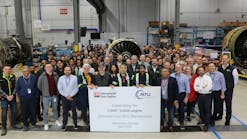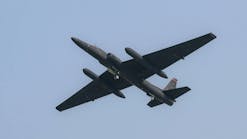Sitting in the eye of four hurricanes, three Ground Support Equipment companies share with Ground Support Magazine what they have learned.
November 2004
The last hurricane was more than three weeks ago, and Floridians are attempting to get things back to "normal." As the state begins its recovery and rebuilding efforts following the lashing by four major hurricanes ' Frances, Jeanne, Charley and Ivan ' there is one industry, the GSE industry, which remains strident and optimistic as it views the damage as only a blip on the radar screen. Why? With an industry that has been strapped for the last three years thanks to the disaster of 9/11, a formidable war and exorbitant fuel prices, what's a few pesky little hurricanes? Following are the personal accounts of three ground support equipment companies who continue to weather the storms, literally and figuratively.
FMC Airport Systems by Gene Johnson'
Central Florida and FMC Airport System's Orlando headquarters and production facility were impacted by the recent unprecedented occurrence of natural disasters associated with three hurricanes that came through the region.
General Manager, Chuck Durst comments, "Our operations were impacted by all three hurricanes as we were forced to halt operations and secure our facilities for each storm and implement recovery efforts to return our facilities to working status following each storm. While our plant did not suffer any material damage by these storms; many of our employees were not as lucky - some of them have been burdened with the reality of having to evacuate their homes, suffering days or weeks without electrical power or drinking water at their homes, and in some cases damage to their houses ranging from water damage to loss of roof structures. Further complicating our situation was the impact on our local suppliers, the trucking industry and ocean ports."
"It was a memorable experience to observe neighbors emerging from their homes after the storms passed to check on each other and then pitch in and work together to begin the recovery. The sound of chain saws and generators became commonplace. Networks were formed to provide shelter, roofing materials, ice, water and gasoline in an attempt to return to what we now fondly refer to as normal."
Durst continues, "I am extremely pleased with the response of FMC employees. While many of them dealt with personal issues in each case the offices and production facility were back in operation 24 hours after curfews were lifted. To minimize the impact on our customers we are working extended hours and have added a second shift to product line where necessary."
Phoenix Metal Products Inc. by Brooks Price and Bill Wilcox
Phoenix Metal Products had a September to remember with four hurricanes
in six weeks, and two direct hits. Frances and Jeanne hit three weeks apart
and dropped 28 inches of rain. Each hurricane placed us directly in the cone
of possibility so landfall had to be prepared for. Each time we prepared
it took four work days to load everything inside, secure all the equipment
and building and then to un-secure everything.
The first hurricane, Frances, was a slow mover and took the entire Labor Day weekend to pass. From winds of 108 mph, we found the large door to our weld shop broken in half and 25 percent of our roof gone. The fabrication building had roof damage and our storage building was destroyed. We were also without electricity and under a curfew from 6 at night until 6 in the morning for an entire week.
Then Ivan headed in our direction, turned, hit the panhandle of Florida, moved into the Atlantic, swung back around and hit us as a tropical disturbance. It dumped 5 inches of rain on us. We thought this would be the last of the hurricanes that we would see this season. We were wrong.
Last but not least, Hurricane Jeanne did a complete u-turn and was headed straight for us. We had just completed patching up the building from Hurricane Frances and now had to prepare for Hurricane Jeanne. Jeanne made landfall three weeks after Frances and just five miles north, our second eye wall in three weeks with 126 mph winds. Again, we had more roof damage, no electricity; we were back to the curfew and had more National Guard.
It is now October 8, 2004, the curfew has been lifted, the National Guard has gone, the county is trying to clean up and we are patched and back in production. We have learned from this that you can't take Mother Nature for granted; you can never be over-prepared and always have as many generators on hand as you can find. This was a very frustrating season for us and for our employees, not knowing if any of us were going to have jobs or homes when all of this was over.
We would like to thank our customers and friends who called to check on us. We are fine for now and just look at it as another setback in the aviation industry that can only make us stronger.
Trepel Airport Equipment Inc. by Ed Hightower
Hurricane Charley took us by surprise at our home office for Trepel Airport Equipment in Orlando. I had left on a trip the day before it hit, convinced that it was too weak and that we were too far inland to worry. That turned out to be wrong on both counts. Winds topped 100 mph at Orlando International Airport as the eye roared through. Damage was sporadic, but heavy in places. Shingles blew off of many homes and trees fell down all over heavily wooded Orlando. Power was out for over a week in many places, although thankfully only 18 hours for us.
For Frances, we scrambled to prepare more thoroughly. We bought a lot more water and batteries and boarded up most of the windows. Where Charley raced through in 45 minutes, Frances ground on all day long. Fortunately, with lower winds and weaker trees already fallen, much less damage was done. We never lost power, but many areas did, again for days.
As Jeanne was wobbling around, we were in disbelief that we would get hit again. It just wasn't possible, was it? This time I bought a small generator, convinced that our luck would run out. Nothing could be worse than to be stuck in your house for days in steamy Florida with food rotting in the refrigerator and not even a fan to keep you cool! Tension was high with Jeanne because there was fear that it would strengthen and might pass directly over Orlando. Neither happened, but again we had a full day of high winds, gusting to over 70 mph at times. I had the generator ready to start on the back porch, but again never had to. If you have ever watched trees tossed around by them or heard the low, freight train rumble of really high winds, you can appreciate the experience.
The worst luck had to be in Bartow, Florida. Charley, Frances and Jeanne all passed within miles of the town and damage was significant for all three. Even though we know about hurricanes here in Florida, there is nothing like personal experience to give you new respect. What did we learn?
I want to thank FMC, Trepel and Phoenix for sharing their stories with Ground Support Magazine. In the aftermath, it can be difficult to revisit a trying situation. If you would like to share your story or perhaps what you have been doing in the wake of the storms, we would love to hear from you. Please contact Karen Reinhardt at [email protected].
This just in ' An October 27th news release from AirTrans reports AirTran Holdings, Inc., the parent company of AirTran Airways, Inc., had a net loss for the quarter ending September 30, 2004, of $9.8 million.
Commenting on the quarter's performance, Joe Leonard, AirTran Airways'chairman and chief executive officer, said, "During the third quarter of 2004, AirTran Airways experienced four hurricanes that impacted our Florida markets which account for over 50 percent of our traffic on an annualized basis. The effects of the hurricanes coupled with a weak revenue environment and record high fuel prices resulted in our loss during the third quarter." Leonard added, "The tireless efforts of our Crew Members to cope with the aftermath of the storms and to accommodate our passengers demonstrate one of the finest qualities of our AirTran Airways family."
Stan Gadek, AirTran Airways' senior vice president and chief financial officer, said, "While third quarter unit costs were affected by the hurricanes, we believe that the trend toward lowering unit costs will continue. We anticipate that our fourth quarter unit cost improvements will reflect greater savings as a result of additional cost reduction programs recently put into effect."






